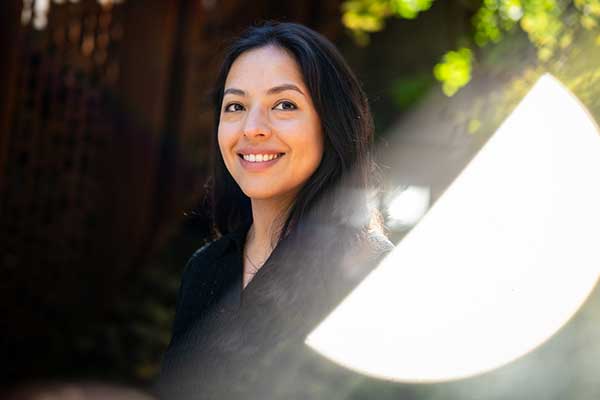Computer Engineering PhD Student Wins ACM/IEEE CS George Michael Memorial HPC Fellowship

Ana Veroneze Solórzano, PhD’28, computer engineering, won the prestigious 2025 ACM/IEEE CS George Michael Memorial HPC Fellowship for broadening the societal impact of HPC using privacy-preserving and incentive-driven mechanisms. The fellowship honors exceptional PhD students throughout the world whose research focus areas are in high performance computing, networking, storage, and large-scale data analysis. Solórzano, who is advised by ECE Associate Professor Devesh Tiwari, also won the 2022 ACM Special Interest Group on High Performance Computing (SIGHPC) Computational and Data Science Fellowship.
This article originally appeared on Northeastern Global News. It was published by Cody Mello-Klein. Main photo: Ana Veroneze Solórzano, a PhD candidate at Northeastern University, is researching ways to mitigate supercomputer energy usage. Photo by Alyssa Stone/Northeastern University.
This researcher is transforming high-performance computing to be more energy efficient – and private
Ana Veroneze Solórzano often jokes that she ended up in high-performance computing by accident. What’s not a joke is that she’s now transforming a field that itself is transforming the world.
High-performance computing, or HPC, doesn’t tackle small problems. Solving global warming and revealing the mystery of how galaxies are formed are par for the course with those who operate the world’s most powerful supercomputers. However, the field has problems of its own –– massive energy usage, gaps in privacy and inequitable access.
Solórzano, a computer engineering Ph.D. candidate at Northeastern University, is pushing HPC in bold new directions that could address those very challenges. The two prongs of her research, for which she recently received a George Michael Memorial HPC Fellowship, aim to make HPC more sustainable and private for the world’s supercomputer users –– and the millions of people that HPC research will potentially help.
“I saw [in HPC] an opportunity to learn more about the technical aspects of computing, on deeply how the architecture of a CPU or GPU worked but also [how it] caused an impact in the world,” Solórzano says.
Growing up in Porto Alegre, Brazil, a career in computing wasn’t part of Solórzano’s plan. Her self-deprecating joke about her winding path to HPC is partially true. She only ended up going into computer science because the coordinator for the international relations track she originally wanted to enter at a small private university in Brazil failed to show up for a meeting.
Instead, she had a run-in with the computer science program adviser, a happenstance meeting that changed the trajectory of her life.
Solórzano ultimately received her bachelor’s degree in computer science from the Federal University of Santa Maria. Solórzano later secured a position at the National Institute of Space Research in Brazil, working to apply an algorithm to identify particles in the universe. Her first taste of HPC only reinforced her need to further study advanced computing, and she eventually received her master’s degree from the Federal University of Rio Grande do Sul.
“They knew exactly the computational powers of the processors they were using and how to take advantage of that to cause an impact,” Solórzano says. “That’s when I saw if I get good at this specific field, I can do a lot of things.”
Now at Northeastern, Solórzano is tackling the field’s most pressing challenges at an institution that has gained a reputation for innovative and impactful computing research. She is the third Northeastern student and member of the Goodwill Computing Lab to receive the George Michael Memorial HPC Fellowship.
Read full story at Northeastern Global News